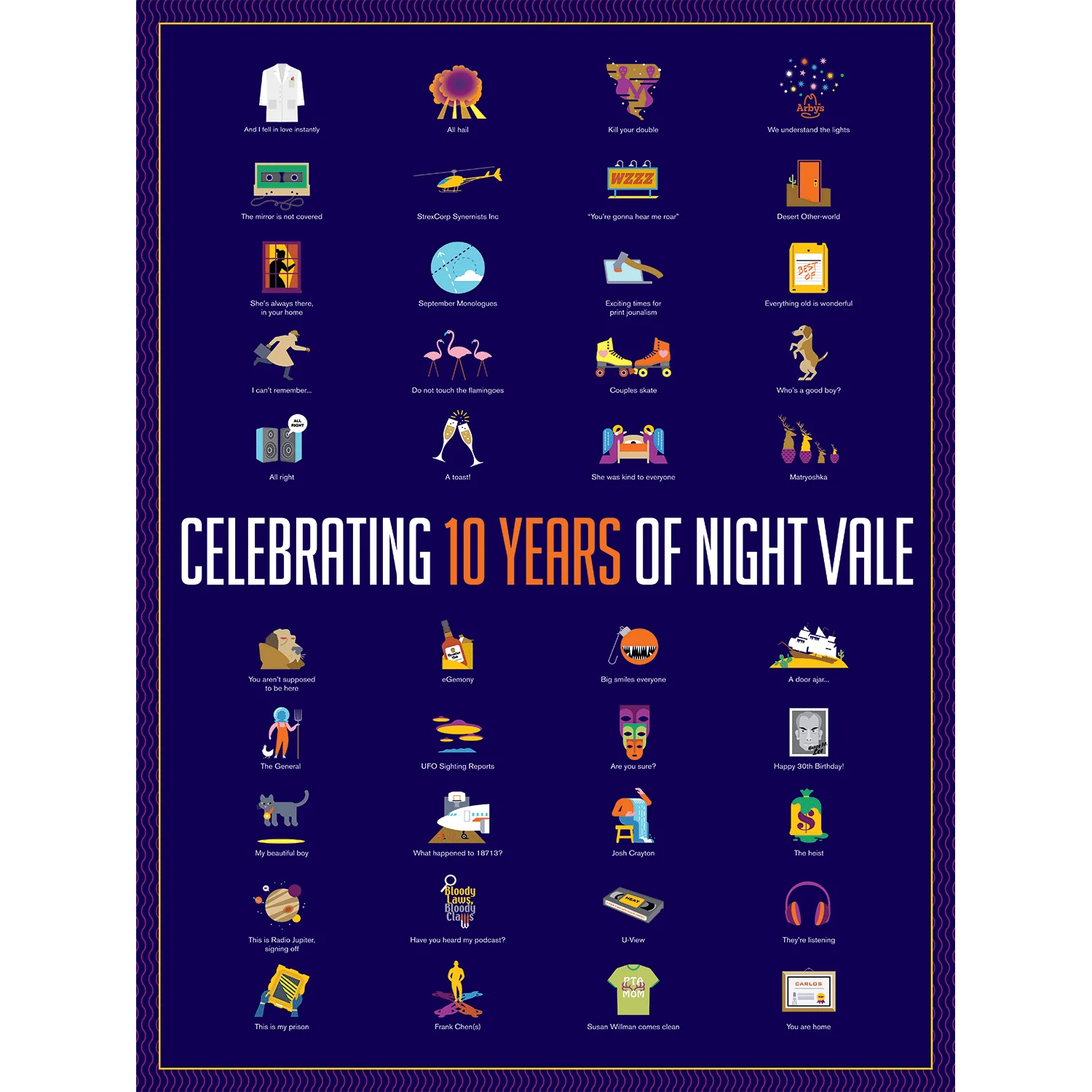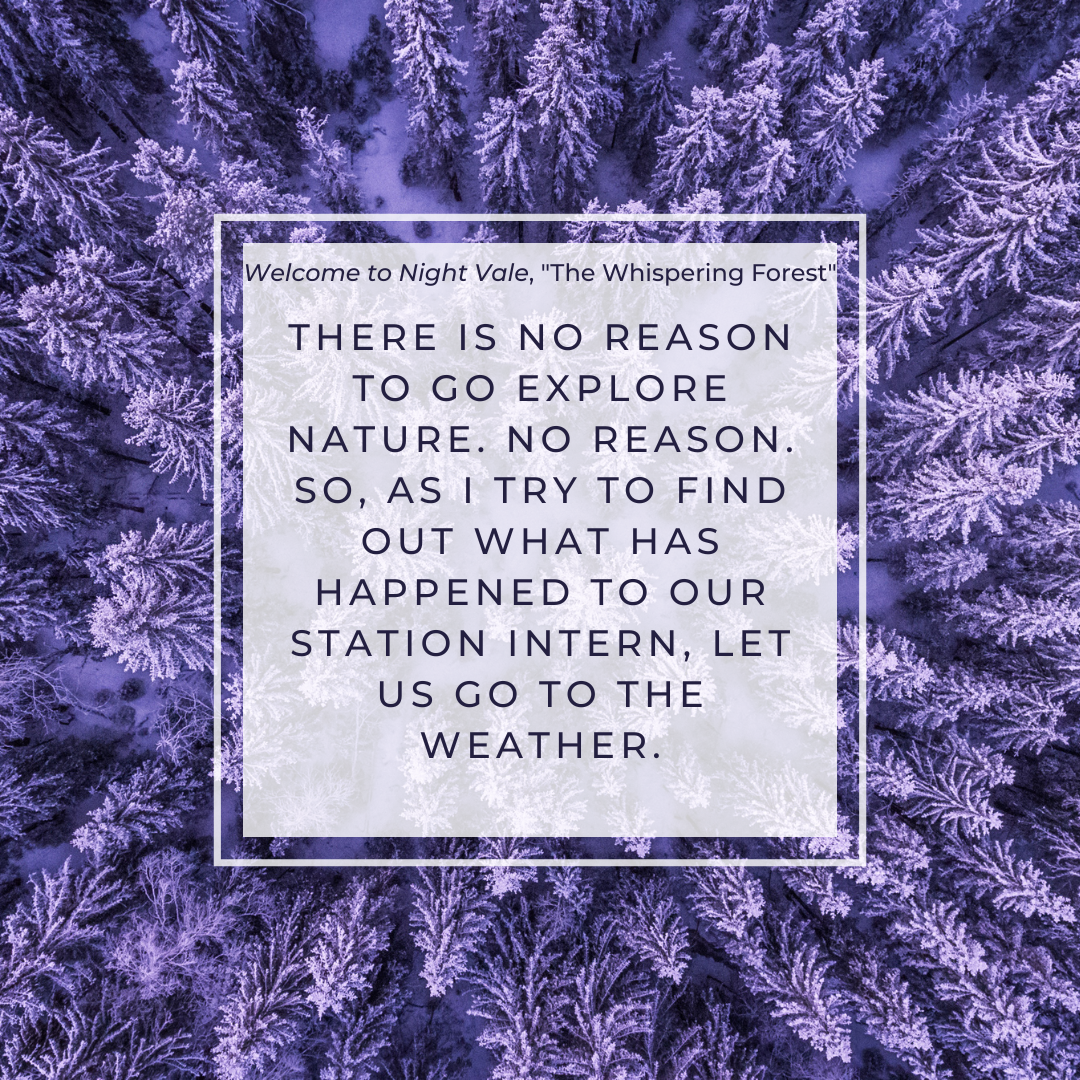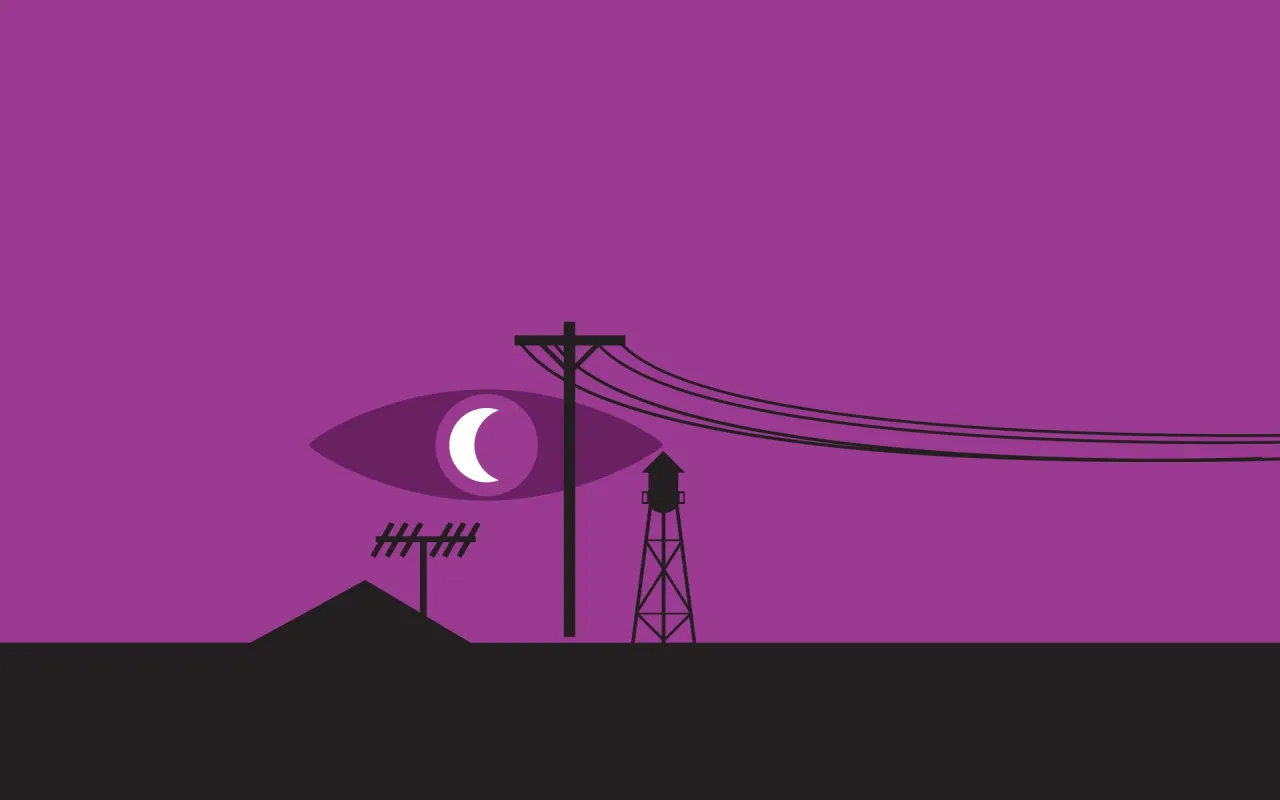Entertainment
Related articles:
For a decade, Welcome to Night Vale has been a staple of fiction podcasting, the Norm Peterson of the podcast charts. It may not always be on the timeline, but with a decade of consistent biweekly uploads and live show tours… it’ll turn up.

The house that Joseph Fink and Jeffrey Cranor built has stood strong for ten years. Let’s go back to the foundation and see what we can learn from the show’s formative first season. For this piece, I went back and listened to the first thirty episodes of Night Vale in two weeks.
Never do this. I’ll go into detail as to why later, but just know the timeline was purely to meet a Halloween deadline, not because the show is particularly suited for chain-listening.
Disclaimer: In 2018, Night Vale Presents launched a recap show for Night Vale called Good Morning, Night Vale, starring voice actors from later seasons going through the show episode by episode to discuss them with the context of behind-the-scenes information. This would’ve been an excellent addition to my knowledge base for this piece but it would’ve added an additional 30 hours of content about the 15 hours of podcast I’d just listened to. That’s a recipe to ensure I get so sick of the show I’d never touch Night Vale again. As such, I’m going in without that additional metatextual context.
What is Welcome to Night Vale?
For the older millennials and gen X in the audience who don’t know, the easiest pop culture shortcut to Night Vale I can think of is “A Prairie Home Companion if Keillor wasn’t a creep and also had the guts to write horror.” The likes of Carl Krebsbach and Clarence Bunsen wouldn’t last a day in Night Vale. For the 20-somethings in the audience: if you take a pencil eraser to King Falls AM, you’ll find the bedrock of Welcome to Night Vale underneath.
Each episode is presented as a half-hour community radio show hosted by Cecil Palmer (Cecil Baldwin), sporting a voice so sonorous it launched a thousand Tumblr cosplays. Each broadcast uses the loose framework of a season-long plot to tell standalone stories every week that can be consumed out of order, but there’s a little something extra there for the audience paying attention episode-by-episode. 75% of the way through each episode Cecil will throw to “the weather,” which in actuality is usually a song by an independent artist, a bespoke instrumental piece for that episode’s plot arc, or a song by show co-creator Joseph Fink.
In the final third the plot of the episode wraps up, Cecil gives a monologue summarizing the message of the week, and then the credits roll. Nestled in the credits is one last bit of creative writing with “today’s proverb,” usually a humorous-but-dark missive fitting with the theme of Night Vale to serve as a carrot for listening through the promotional material and credits.
audio-player-details^^^^^Clip: "First Date"^^^^^https://insights.adswizz.com/hubfs/simplecast-files/blog/audio/firstdatecoldopen_nightvale.mp3
Transcript: [Cecil] Mountains. Endless mountains. Peak after barren peak. And what lies restless in the shadowed valleys? I cannot say. I cannot say. Welcome to Night Vale
Rules of the Listen-Through
- Every instance of The Weather must be listened to in full.
- Every cold open from Cecil must be listened to, even if that meant fiddling around finding the end of the last preroll ad every time.
- The proverbs were optional.
That last rule will incense anyone like the person in one of my classes in 2014 who, upon hearing I skip to the next episode when postroll ads begin, exclaimed “the proverbs are the best part!” I appreciate the fact that Night Vale’s postroll ads are a compromise so there don’t have to be midrolls that would fuck up the mood of the show, but a pithy horror quip during the credits is not a big enough carrot to do the same time-jump acrobatics twice per episode.
Also, embarrassingly enough, I only noticed the show’s Patreon provides ad-free versions of every episode after completing my listening.
How I Found Night Vale
Fall rolls in quickly in the corner of western Kentucky I grew up in. Some trees get their final moment of brilliance with autumnal colors, but more often than not I’d look up one day to find the limbs were bare and a smattering of brown desiccated leaves were scattered on the dead grass. A season change without ceremony. Instead, the most common sign of October growing up was fields of pale brown, crops of corn and soybeans left to dry before harvest. This setting combined with living out in the middle of nowhere meant every autumn during college I was taking long drives through windswept farmland full of dead things. Perfect conditions for an eerie podcast to take root.
It was in those conditions I found podcasting, suffering the god-awful Windows version of iTunes to load episodes of the first few celebrity-laden podcasts I’d bumbled into (Judge John Hodgman, The Thrilling Adventure Hour, Still Untitled: The Adam Savage Project) onto my purple fifth-gen iPod Nano. That little purple brick brought the world of podcasting to my door.
For the sake of satisfactory narrative, I want to say I first tried Night Vale during a fall semester, leaves skittered across the parking lot of the smallest community college in Kentucky. A convenient fiction I’ve created over the years because an autumnal scene feels better for Night Vale. Regardless of when I started, I can say there was a time in October of 2013 where I got in my car to leave campus and queued up a fateful moment in Night Vale history.

What I Remembered
In a wholly unscientific experiment to see what stuck over the eight or so years since last listening to early episodes of the show, I started a word document full of every character, episode story, and season-long arc I could remember without googling or talking to someone else. To a person who has never listened to the show, that document full of random missives like “John Peters (you know, the farmer?)” and “levitating Russian bathroom cat” would be a concerning read.
Having now listened to the first thirty episodes, the first season was less sticky than memory serves. A fair amount of the show’s memorable characters and settings are – at least partially – established during the first season, but the catalytic elements introduced at the end of the first season are needed to fully realize the Night Vale-iness of it all.
Iconic moments in my original notes are either condensed versions of actual moments (e.g. I would’ve bet money Carlos kissed Cecil in the Arby’s parking lot) or transposed season 2 episodes far earlier in the timeline (e.g. Cecil dealing with a sentient computer in A Beautiful Dream).
audio-player-details^^^^^Clip: "A Beautiful Dream"^^^^^https://insights.adswizz.com/hubfs/simplecast-files/blog/audio/beautiful_dream.mp3
Transcript: (computer voice speaking loud and clearly) HELLO, CECIL. HOW ARE YOU?
[Cecil] Computer! I am...I am doing well. How are you?
[Computer] BETTER. CECIL, DO YOU LOVE COMPUTER?
[Cecil] I admit, I had not given it much thought. I like computers generally. They calculate things and power off and on.
Oh, and Mara Wilson. Can’t forget that iconic performance.
Five Lessons New Podcasters Can Learn From Night Vale
- Keep it simple, silly.
Sound design is the key to making particularly outlandish scenes feel realistic in fictional podcasting. It’s also entirely optional depending on budget and scenario, especially on small-scale productions like Night Vale.
The show has always sounded good, even on the worst car stereos or cheapest headphones. I can’t tell you how many audio fiction series with lovingly-crafted sound design I had to abandon because my day job involved driving and they turned out to be unlistenable on anything other than my mildly expensive editing headphones. Starting small and working your way up is the ultimate future-proofing.
- Know your show and present it accordingly.
Welcome to Night Vale is an experience that demands to be respected. One must keep in mind it is not designed to be devoured in several long sessions. There’s a reason I burned out on it in 2015/2016 and there’s a reason I damn near burned out on it this year. During a season you can set your watch by Night Vale, first and fifteenth of the month. No more, no less. Regardless of if the show had infinite money and time to produce a quality product, I’d argue Night Vale would be a worse product if it were released weekly.
Of course, there can be downsides to becoming Old Reliable, which leads to the next point:
- Diversify beyond one income stream.
Back in 2012, Fink and/or Cranor were in enough of a silly goofy mood to take potshots at popular brands oversaturating the podcast market (namely Audible), as well as massive brands seemingly out of reach for lowly podcasting. In 2022, those same episodes now sport prerolls courtesy of ad clients facilitated by PRX, so Fink and Cranor chime in to pitch BetterHelp therapy and Progressive insurance. Props if they ever landed Subway or Tide, who got done particularly dirty in season one.
Even in 2022 as arguably one of the most-known audio dramas around, most episodes of my listening marathon had an ad spot dedicated to politely asking fans to pledge to the Night Vale Patreon account, as it has been losing subscribers. While the account jumped 2,000 pledges over the first few months of the pandemic, Graphtreon shows a fifteen percent drop since it hit its peak in 2021. Churn is a constant and worrisome reality, especially for a company that made most of its money from live events before a global pandemic gut-punched that particular revenue stream. A podcast can be successful in the short-term with only one income stream, but diversification of income is how one can continue to be successful and fairly pay its employees for years to come.
- Lift others up / work with cool people
The Weather elevates Night Vale from a pretty-good concept for an infinitely-renewable fiction series (not unlike its distant ancestral cousin Lake Wobegon) into something truly special.
I hosted and attended more than my fair share of open mic nights in college. The closest I’ve seen a podcast of that era come to replicating a good open mic night is Night Vale’s Weather segment. A beautiful place with the possibility of encountering something amazing and wholly outside of one’s comfort zone.
Sure, some hot garbage will wander onto the stage, but that’s part of the appeal. The anticipation for what might come next. Good or not, but you’re going to hear something new.

Even though a significant portion of the music acts featured in early Night Vale have either abandoned or rebranded their Bandcamps since 2013, one can still go back and see the hundreds of glowing reviews and supportive comments left by Night Vale fans who’d otherwise would never have found the act.
Also, and this might seem like a silly thing to highlight, but I cannot understate the importance of the fact Night Vale allowed music in The Weather that’s for adults. The Weather plays songs that can, if necessary, casually describe concepts like masturbation or sex in a podcast that isn’t branded Adult XXX Edgy Extreme Content. There aren’t many outlets like this anymore. It’s damn near a public service that Night Vale provides to this day.
- Don’t be afraid to try new things.
Finally, I explain why I listened to thirty episodes when the first season was only twenty-five.
The first season’s finale is a turning point for a lot of fans. It canonizes Cecil and town newcomer Carlos as having feelings for each other, officially making Cecil’s fawning over Carlos legitimate and not some perverse longform homophobic joke. Several recurring characters get their moment in the spotlight, almost all the open threads of the season are closed. It’s not a bad finale.
But, I argue there are two massive turning points just beyond that: Mara Wilson’s phenomenal performance in episode 26, and the introduction of the Dana plotline.
Any newcomer to Night Vale is told explicitly the show is written in such a way you can pick up wherever. There are a handful of favorite episodes with vital plot points both Night Vale and fans recommend as good starting points. Rarely does anyone recommend burning through season one in its entirety in a couple of days. I very much am an outlier as far as expected/beneficial listening habits for this podcast. By episode 12, I had already begun to burn out.
Then I hit #13: A Story About You. Told entirely in second-person, the show continually toys with expectations and crafts a wonderful, unnerving plot around an unnamed character.
Just as I’m coming down off the high of 13, along comes a sandstorm that causes episode 16 split into two parts, introducing Night Vale’s counterpart Welcome to Desert Bluffs, hosted by a Cecil counterpart voiced by the phenomenal Kevin R Free.
Episodes 13, 16a, and 16b are high water marks establishing the fact Night Vale likes to shake things up. Dana in season two shows those shake-ups will be a series staple and can introduce amazing plot-important concepts that stick with the show for ages. While not in the scope of my listen-through, I can’t mention Night Vale’s tendency to play with format without mentioning the 2018 episode that used the show’s dynamic ad insertion technology to record and serve one of three endings, giving the audience random results each time they downloaded the episode.
You Can’t Replicate the Past
Podcasting never has and never will be a meritocracy. One cannot simply bootstrap their way into having a self-sustaining show. As the aforementioned Patreon ads show, even a show as successful as Night Vale has to actively keep the plates spinning if they want to keep the lights on.
That said, audiences love consistency. That doesn’t mean the content has to remain the same, but look at how unflappingly consistent the upload schedule of the podcast has been for ten years now. Any list of Night Vale episodes featuring upload dates is just a sea of the 1st, then the 15th. Episodes rarely vary in length. The feed isn’t cluttered with too much bonus content or feed drops too close together. The ads aren’t doubled up and they only serve three in one block.
Metatextuality, there are some things about Night Vale that would be difficult to replicate now. Tumblr existing as it did in 2012 was vital to the show gaining the fandom traction it did; Tumblr’s a very different place now. That said, there’s still incredibly useful lessons to be dug up from the sand of that tiny desert town, some of it possibly contained in wooden crates that occasionally tick.
Gavin Gaddis is a freelance journalist and podcaster. They've worked as a media critic in various positions since 2011. You can see their work on their website or find them on Twitter.

